2023-2024学年高考英语:非谓语动词做补语课件(共41张PPT)
文档属性
| 名称 | 2023-2024学年高考英语:非谓语动词做补语课件(共41张PPT) | 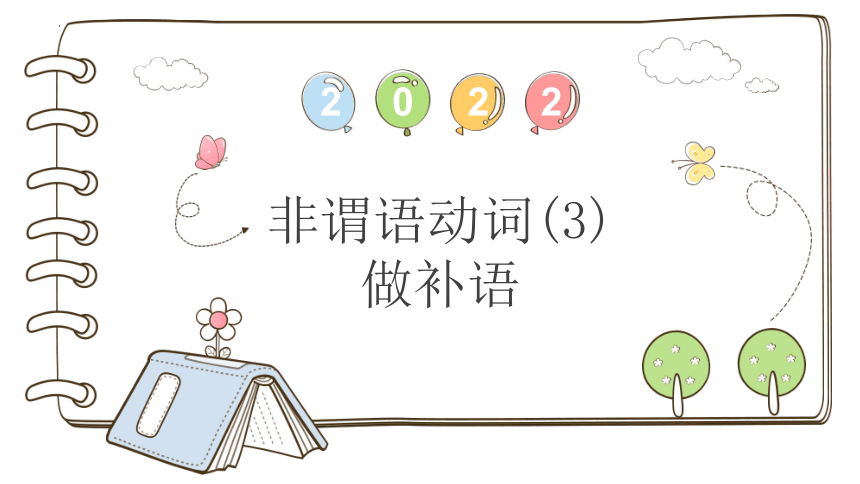 | |
| 格式 | pptx | ||
| 文件大小 | 494.1KB | ||
| 资源类型 | 教案 | ||
| 版本资源 | 通用版 | ||
| 科目 | 英语 | ||
| 更新时间 | 2024-03-12 15:04:02 | ||
图片预览

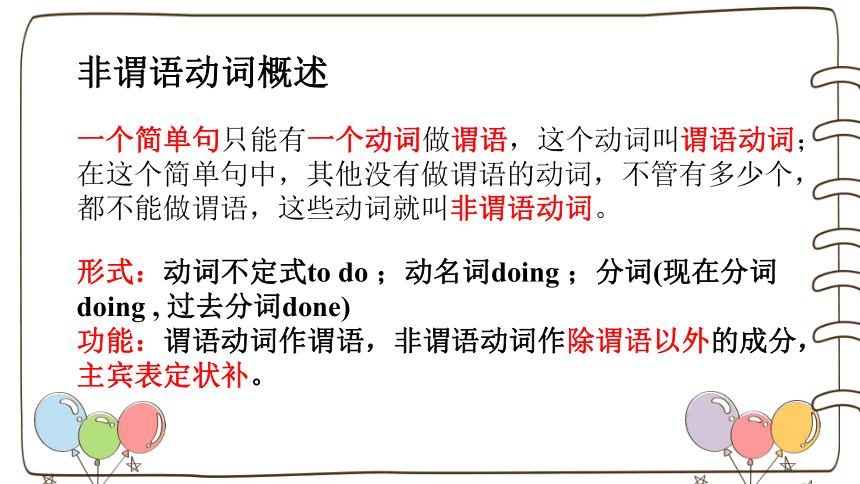
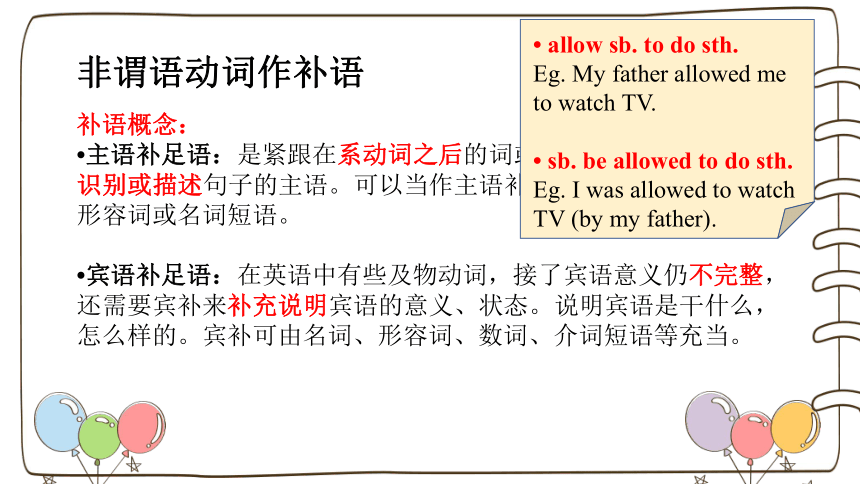

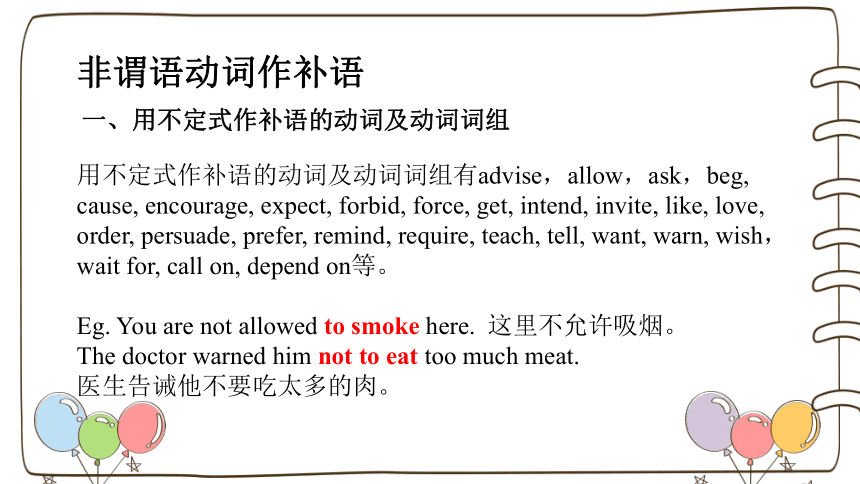
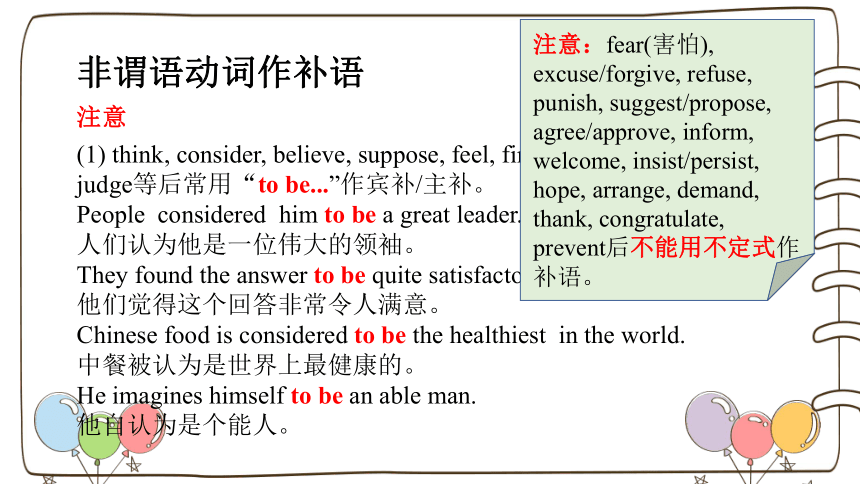
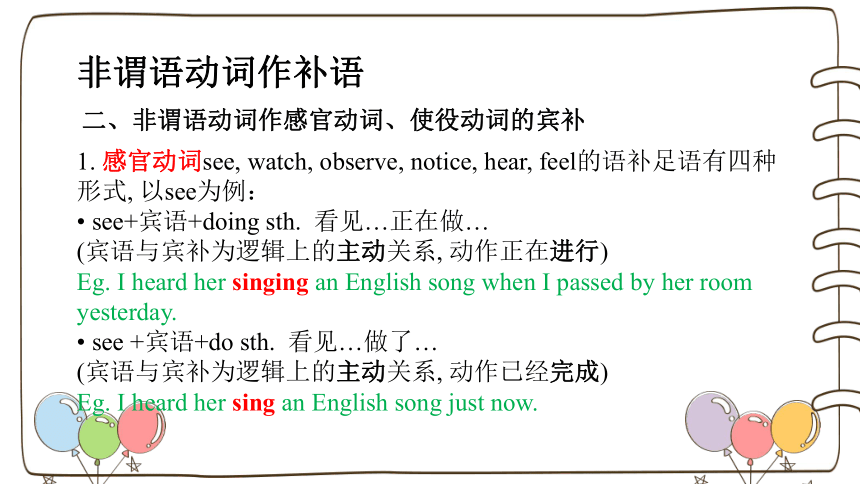
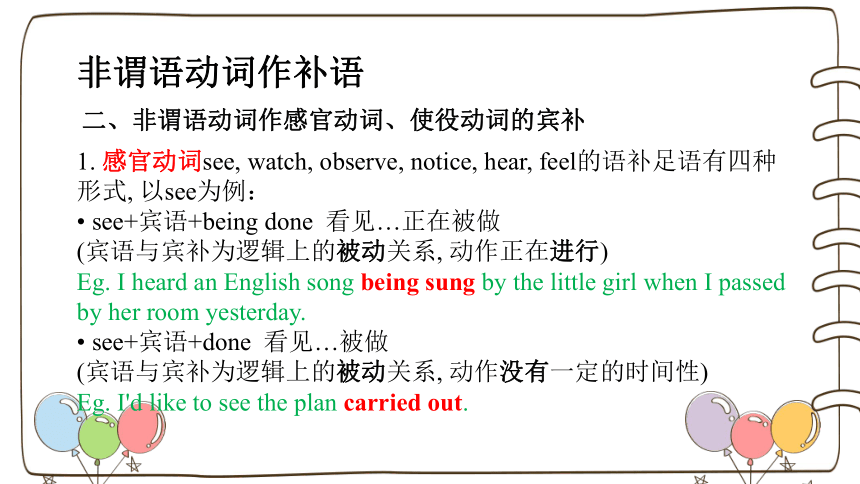
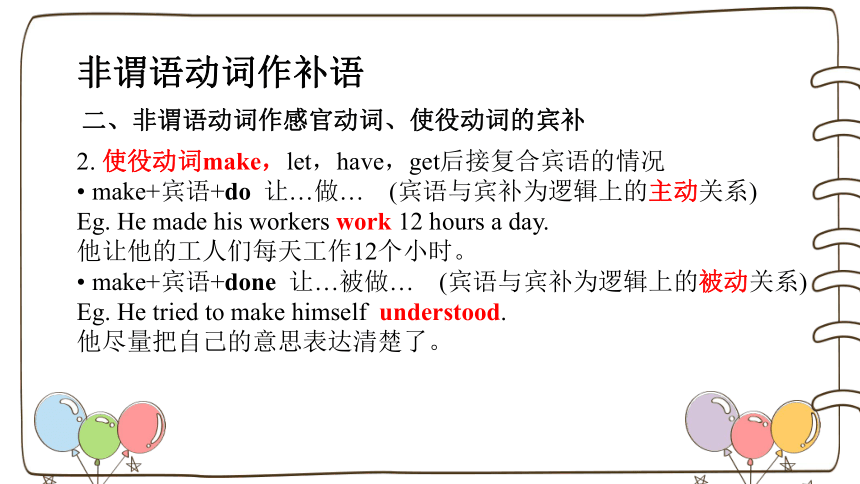
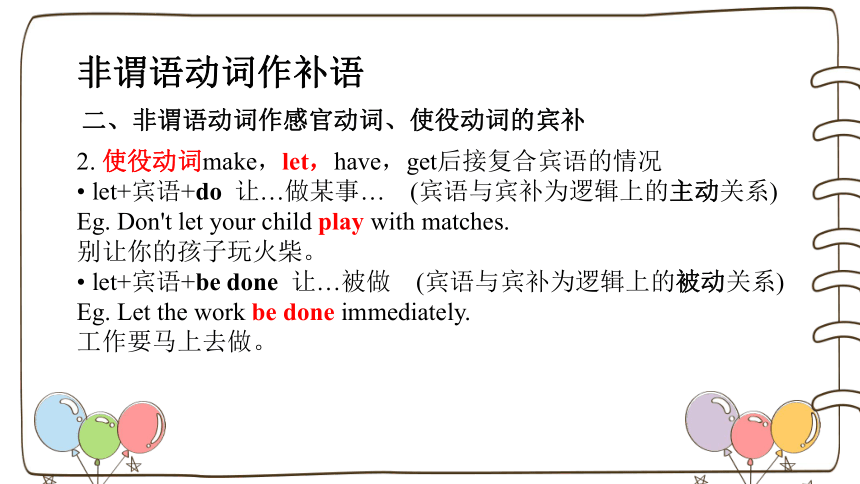

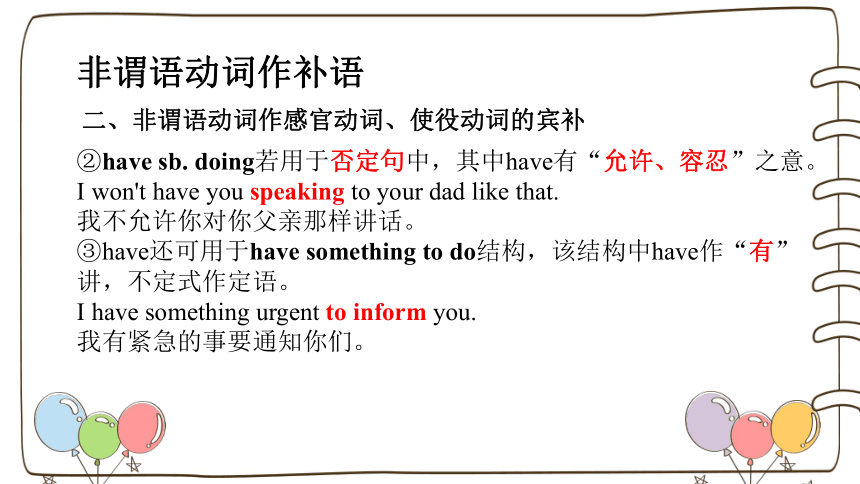
文档简介
(共41张PPT)
2
0
2
2
非谓语动词(3)
做补语
非谓语动词概述
一个简单句只能有一个动词做谓语,这个动词叫谓语动词;在这个简单句中,其他没有做谓语的动词,不管有多少个,都不能做谓语,这些动词就叫非谓语动词。
形式:动词不定式to do ;动名词doing ;分词(现在分词doing , 过去分词done)
功能:谓语动词作谓语,非谓语动词作除谓语以外的成分,主宾表定状补。
非谓语动词作补语
补语概念:
主语补足语:是紧跟在系动词之后的词或短语并添加信息,用来识别或描述句子的主语。可以当作主语补语的通常有名词,代词,形容词或名词短语。
宾语补足语:在英语中有些及物动词,接了宾语意义仍不完整,还需要宾补来补充说明宾语的意义、状态。说明宾语是干什么,怎么样的。宾补可由名词、形容词、数词、介词短语等充当。
allow sb. to do sth.
Eg. My father allowed me to watch TV.
sb. be allowed to do sth.
Eg. I was allowed to watch TV (by my father).
非谓语动词
做补语
非谓语动词作补语
一、用不定式作补语的动词及动词词组
用不定式作补语的动词及动词词组有advise,allow,ask,beg, cause, encourage, expect, forbid, force, get, intend, invite, like, love, order, persuade, prefer, remind, require, teach, tell, want, warn, wish,wait for, call on, depend on等。
Eg. You are not allowed to smoke here. 这里不允许吸烟。
The doctor warned him not to eat too much meat.
医生告诫他不要吃太多的肉。
非谓语动词作补语
注意
(1) think, consider, believe, suppose, feel, find, imagine, prove, appoint,judge等后常用“to be...”作宾补/主补。
People considered him to be a great leader.
人们认为他是一位伟大的领袖。
They found the answer to be quite satisfactory .
他们觉得这个回答非常令人满意。
Chinese food is considered to be the healthiest in the world.
中餐被认为是世界上最健康的。
He imagines himself to be an able man.
他自认为是个能人。
注意:fear(害怕), excuse/forgive, refuse, punish, suggest/propose, agree/approve, inform, welcome, insist/persist, hope, arrange, demand, thank, congratulate, prevent后不能用不定式作补语。
非谓语动词作补语
二、非谓语动词作感官动词、使役动词的宾补
1. 感官动词see, watch, observe, notice, hear, feel的语补足语有四种形式, 以see为例:
see+宾语+doing sth. 看见…正在做…
(宾语与宾补为逻辑上的主动关系, 动作正在进行)
Eg. I heard her singing an English song when I passed by her room yesterday.
see +宾语+do sth. 看见…做了…
(宾语与宾补为逻辑上的主动关系, 动作已经完成)
Eg. I heard her sing an English song just now.
非谓语动词作补语
二、非谓语动词作感官动词、使役动词的宾补
1. 感官动词see, watch, observe, notice, hear, feel的语补足语有四种形式, 以see为例:
see+宾语+being done 看见…正在被做
(宾语与宾补为逻辑上的被动关系, 动作正在进行)
Eg. I heard an English song being sung by the little girl when I passed by her room yesterday.
see+宾语+done 看见…被做
(宾语与宾补为逻辑上的被动关系, 动作没有一定的时间性)
Eg. I'd like to see the plan carried out.
非谓语动词作补语
二、非谓语动词作感官动词、使役动词的宾补
2. 使役动词make,let,have,get后接复合宾语的情况
make+宾语+do 让…做… (宾语与宾补为逻辑上的主动关系)
Eg. He made his workers work 12 hours a day.
他让他的工人们每天工作12个小时。
make+宾语+done 让…被做… (宾语与宾补为逻辑上的被动关系)
Eg. He tried to make himself understood.
他尽量把自己的意思表达清楚了。
非谓语动词作补语
二、非谓语动词作感官动词、使役动词的宾补
2. 使役动词make,let,have,get后接复合宾语的情况
let+宾语+do 让…做某事… (宾语与宾补为逻辑上的主动关系)
Eg. Don't let your child play with matches.
别让你的孩子玩火柴。
let+宾语+be done 让…被做 (宾语与宾补为逻辑上的被动关系)
Eg. Let the work be done immediately.
工作要马上去做。
非谓语动词作补语
二、非谓语动词作感官动词、使役动词的宾补
2. 使役动词make,let,have,get后接复合宾语的情况
have+宾语+do sth. 让…做某事… (主动关系)
have+宾语+doing sth. 使…持续做某事 (主动关系)
have+宾语+done 使…被做 (被动关系)
注意:①have sth. done还表示“使…遭受…”之意。
Tom had his leg broken while playing football.
汤姆踢足球时摔断了腿。
非谓语动词作补语
二、非谓语动词作感官动词、使役动词的宾补
②have sb. doing若用于否定句中,其中have有“允许、容忍”之意。
I won't have you speaking to your dad like that.
我不允许你对你父亲那样讲话。
③have还可用于have something to do结构,该结构中have作“有”讲,不定式作定语。
I have something urgent to inform you.
我有紧急的事要通知你们。
非谓语动词作补语
二、非谓语动词作感官动词、使役动词的宾补
2. 使役动词make,let,have,get后接复合宾语的情况
get+宾语+to do sth. 使…做某事 (主动关系)
get+宾语+doing sth. 使…做某事 (主动关系)
get+宾语+done 使…被做 (被动关系)
Eg. He got me to post the letter for him. 他让我替他寄信。
The captain got the soldiers moving toward the front after a short rest.
休息了片刻之后,上尉让士兵们朝前线行进。
I’ll get my bike repaired tomorrow. 我明天要(请人)修一下我的自行车。
非谓语动词作补语
二、非谓语动词作感官动词、使役动词的宾补
3.下列动词(词组)在主动语态中用不带to的不定式作宾语补足语,但在被动语态中要加上to——吾看三使两厅一感觉。
5看(look at,see,watch,notice,observe);
3使(make,let,have);2听(listen to,hear);1感觉(feel)。
Eg. The boss made him work 14 hours a day.
He was made to work 14 hours a day.
I see him walk to school
He is seen to walk to school.
非谓语动词作补语
三、动词leave,keep,find,catch及介词with后非谓语动词作宾补的情况
leave sb./sth. doing sth. 让某人/物一直做某事(主动,进行)
Eg. It's wrong to leave the machine running.
让机器一直运转着是不对的。(主动,进行)
leave sth. undone 留下某事未做(被动,完成,一般以undone, unfinished, unsettled, untouched居多)
Eg. The guests left most of the dishes untouched, because they didn't taste delicious.
大部分的菜客人们都没动,因为它们不可口。(被动,完成)
非谓语动词作补语
三、动词leave,keep,find,catch及介词with后非谓语动词作宾补的情况
leave sb. to do sth. 留下某人去做某事 (主动,将来)
Eg. He left, leaving me to do all the rest work.
他走了,留下我去做剩余的所有工作。(主动,将来)
leave sth. to be done 留下某事要做(被动,将来)
Eg. We hurriedly ended our meeting, leaving many problems to be settled.
我们匆匆忙忙地结束了会议,留下很多问题等待解决。(被动,将来)
非谓语动词作补语
三、动词leave,keep,find,catch及介词with后非谓语动词作宾补的情况
keep sb./sth. doing 使某人/物一直做某事
Eg. Keep the engine running. 别让发动机熄火。
keep sb./sth. done 使某人/物被…(表示被动且完成, 或表示状态)
Eg. You should keep me informed of his whereabouts.
你应该让我了解他的行踪。
非谓语动词作补语
三、动词leave,keep,find,catch及介词with后非谓语动词作宾补的情况
find sb. doing 发现某人正在做某事
Eg. I found her quietly weeping alone. 我经常发现她独自默默流泪。
find sb./sth. done 发现某人/物已经…(表状态或完成)
Eg. I found him buried in a novel. 我发现他在埋头读一本小说。
find sb./sth. to be… 发现某人/物…
Eg. We found him to be dishonest. 我们发现他不诚实。
非谓语动词作补语
三、动词leave,keep,find,catch及介词with后非谓语动词作宾补的情况
catch sb. doing sth. 撞见某人正在做某事
Eg. I caught John reading my private letters.
我撞见约翰在看我的私人信件。
非谓语动词作补语
三、动词leave,keep,find,catch及介词with后非谓语动词作宾补的情况
with sb./ sth. doing (表主动且进行, 或表特征)
Eg. With a boy leading the way, they started towards the village.
由一个小男孩领着路,他们朝那个村子去了。
with sth. being done (表被动且进行)
Eg. With my bike being repaired, I can go nowhere.
我自行车正在被修, 我哪儿也去不了。
非谓语动词作补语
三、动词leave,keep,find,catch及介词with后非谓语动词作宾补的情况
with sth. done (表被动且完成, 或表状态)
Eg. With the work done, he went home. 工作做完后,他回了家。
with sth. to do (表示将来)
Eg. With a lot of work to do, he wasn't allowed to go out.
因为还有很多工作要做,他没有被允许外出。
非谓语动词作补语
四、常用不定式作主语补足语的句型
sb./sth. be said/ believed/known/supposed/reported/considered/found/ thought+ to do/to have done/to be done/to have been done+其他。
Eg. He is said to have gone abroad. (=It is said that he has gone abroad.)
据说他出国了。
Heat is considered to be a form of energy.
热能被认为是一种能量形式。
You’re supposed to pay the bill by Friday.
你应该在星期五前付账。
技巧点拨
非谓语动词作补语
宾语或主语与提示词为逻辑上的主动关系
doing
(to) do
宾语或主语与提示词为逻辑上的被动关系
被动、完成:done
被动、将来:to be done
被动、进行:being done
练习:非谓语作补语
And when he saw the mists rising from the river and the soft cloud ____________(surround) the mountain tops, he was reduced to tears.
When we saw the road (block) with snow, we decided to spend the holiday at home.
Let those in need______________(understand) that we will go all out to help them.
If we expect people (give up) the habit of driving,we must give them an alternative they can rely on.
The old couple often take a walk after supper in the park with their pet dog _____(follow) them.
In short, it is a grateful heart that makes us (become) kind people.
surrounding
blocked
understand
to give up
following
become
非谓语动词
总结
非谓语动词总结
不定式
①基本形式:to do(表示主动,并且一般表示将来)
Eg. The teacher told us to do morning exercises.
老师让我们做早操。
②被动式:to be done(表示被动,并且一般表示将来)
Eg. The car to be bought is for his sister.
要买的这辆车是给他的姐姐的。
③进行式:to be doing (表示主动和进行)
Eg. She pretended to be reading when the teacher came into the classroom.
老师进来时,她假装正在读书。
非谓语动词总结
不定式
④完成时:to have done(表示主动和完成)
Eg. The thief is said to have escaped.
据说小偷已经逃跑了。
⑤完成被动式:to have been done(表示被动和完成)
Eg. The thief is said to have been arrested.
据说小偷已经被抓住了。
⑥完成进行式:to have been doing (表示主动和完成进行)
Eg. She is said to have been working in the factory over the last 20 years.
据说在过去的20年里,她一直在这家工厂工作。
非谓语动词总结
2. 动名词
①基本形式:doing (表示主动)
Eg. Travelling in space by ordinary people will be common in the future.
在未来,普通人在太空旅行将会是普遍的事情。
②被动式:being done(表示被动)
Eg. Freddy and his band could go nowhere without being followed by their fans. Freddy和他的乐队到哪里都被他们的粉丝跟着。
非谓语动词总结
2. 动名词
③完成式:having done(表示主动和完成)
Eg. I have no idea of his having done such a thing against you.
我不知道他做过这样一件违背你的事情。
④完成被动式:having been done(表示被动和完成)
Eg. Many customers complain of having been given short weight at that shop. 很多顾客抱怨在那家商店被缺斤少两过。
非谓语动词总结
3. 现在分词
①基本形式:doing (表示主动和进行)
Eg. He sat there, reading a newspaper.
他坐在那里,读着一张报纸。
②被动式:being done(表示被动和进行)
Eg. The area being studied may be rich in coal.
这个正在被研究的地方可能富含煤。
非谓语动词总结
3. 现在分词
③完成式:having done(表示主动和完成)
Eg. Having finished my homework, I began to watch TV.
完成作业后,我开始看电视。
④完成被动式:having been done(表示被动和完成)
Eg. Having been told many times,she still can’t remember it.
已经被告诉了很多次,她仍然记不住。
非谓语动词总结
4. 过去分词
及物动词的过去分词表示被动或完成;
polluted river 被污染的河流
不及物动词的过去分词表示主动或完成。
fallen leaves 落叶
注意:非谓语动词本身不能表示现在和过去。非谓语动词表示进行、将来和完成时是相对于谓语动作来说的:和谓语动作同时发生表示进行;发生在谓语动作之后表示将来;发生在谓语动作之前表示完成。
非谓语动词
练习
一、单项选择
1. Back from his two-year medical service in Africa, Dr. Lee was very happy to see his mother ________ good care of at home.
A. taking B. taken C. take D. be taken
2. _______ from Why Do Cats Love Bookstores by Jason Diamond, the article was chosen as a part of the test paper.
Being adapted B. Adapted C. Being suited D. Suited
3. Their new project ______ at the conference, the excited scholars decided to have a barbecue to celebrate the fantastic moment.
to approve B. being approved
C. having approved D. having been approved
B
B
D
一、单项选择
4. During the Mid-Autumn Festival, family members often gather together ________ a meal, admire the moon and enjoy moon cakes.
A. share B. to share C. having shared D. shared
5. Many Chinese brands,________their reputations over centuries, are facing new challenges from the modern market.
having developed B. being developed C. developed D. developing
6. Shanghai has become the first city in China ________ road test plates for autonomous driving trucks (自动驾驶卡车道路测试牌照).
having issued B. to issue C. issuing D. issued
B
A
B
一、单项选择
7. I didn’t mean ________ anything but the ice cream looked so good that I couldn’t help ________ it.
A. to eat; to try B. eating; trying C. eating; to try D. to eat; trying
8. After receiving the Oscar for Best Supporting Actress,Anne Benedict went on ________ all the people who had helped in her career.
to thank B. thanking C. having thanked D. to have thanked
9. Listening to music at home is one thing,going to hear it ________ live is quite another.
A. perform B. performing C. to perform D. being performed
D
A
D
一、单项选择
10. These kids pretended ______ when he was telling them the same joke ______ he did last time.
A.laughing; which B.to have laughed; as
C.laughing; / D.to be laughing; that
11. John is the only one of the students in our class that never ______ a mistake even when it is pointed out to him.
A. admit making B. admits making C. admit to make D. admits to make
12. All the things ______, the old man went home happily with his little grandson.
A. to have finished B. done C. to finish D. being finished
D
B
B
二、单句语法填空
It’s no use _____________(complain) without taking action.
Actually, it is quite normal for the average person ___________(live) in a city to see thousands of ads every single day.
First of all, ___________(become) aware of what causes your worry will help to reduce the stress.
I really appreciate____________ (give) this opportunity and I won’ t let you down.
The airport ____________(complete) next year will help promote tourism in this area.
Keep your legs _____________ (cross)for five minutes to strengthen the muscle.
complaining
living
becoming
being given
to be completed
crossed
二、单句语法填空
7. According to the report, people in the ___________(flood) areas are rebuilding their homes and many roads ___________(lead) to the areas have been repaired.
8. With the appropriate level of difficulty , people may feel like___________ (challenge) it again and again.
9. I’m going to do some shopping this weekend. Do you have anything ___________(buy)
10. ___________(respond) to the unfair and unreasonable ratings and comments from naughty pupils, Ding Talk released a video twice on its official Weibo account, with the theme: Young master, I beg you for your mercy!
flooded
leading
challenging
to buy
To respond
三、语篇语法填空
In your daily life, there are many things 1. __________ (control) by your parents when you are a kid, such as the clothes you wear, the food you eat, where you go and how you get there. It is a good thing. Kids need this kind of 2. __________(protect) and help because they are not old enough 3. __________ (take) care of themselves and make decisions correctly. But with you 4. __________(grow)older, the part of 5. __________(be) a teen is developing your own identity--one that 6. __________(separate) from your parents. Different attitudes towards events like partying may lead to arguments, because your parents will always want 7. __________(protect) you and keep you safe, no matter how old you are. As a result, your parents feel it hard 8. __________ (get) used to the new situation with 9. __________ (increase) anxiety. What kids should keep in mind is that in most cases, your parents can relate to what you're going through because they 10. __________(be) teens once.
controlled
protection
to take
growing
being
is separated
to protect
to get
increasing
were
2
0
2
2
感谢聆听
2
0
2
2
非谓语动词(3)
做补语
非谓语动词概述
一个简单句只能有一个动词做谓语,这个动词叫谓语动词;在这个简单句中,其他没有做谓语的动词,不管有多少个,都不能做谓语,这些动词就叫非谓语动词。
形式:动词不定式to do ;动名词doing ;分词(现在分词doing , 过去分词done)
功能:谓语动词作谓语,非谓语动词作除谓语以外的成分,主宾表定状补。
非谓语动词作补语
补语概念:
主语补足语:是紧跟在系动词之后的词或短语并添加信息,用来识别或描述句子的主语。可以当作主语补语的通常有名词,代词,形容词或名词短语。
宾语补足语:在英语中有些及物动词,接了宾语意义仍不完整,还需要宾补来补充说明宾语的意义、状态。说明宾语是干什么,怎么样的。宾补可由名词、形容词、数词、介词短语等充当。
allow sb. to do sth.
Eg. My father allowed me to watch TV.
sb. be allowed to do sth.
Eg. I was allowed to watch TV (by my father).
非谓语动词
做补语
非谓语动词作补语
一、用不定式作补语的动词及动词词组
用不定式作补语的动词及动词词组有advise,allow,ask,beg, cause, encourage, expect, forbid, force, get, intend, invite, like, love, order, persuade, prefer, remind, require, teach, tell, want, warn, wish,wait for, call on, depend on等。
Eg. You are not allowed to smoke here. 这里不允许吸烟。
The doctor warned him not to eat too much meat.
医生告诫他不要吃太多的肉。
非谓语动词作补语
注意
(1) think, consider, believe, suppose, feel, find, imagine, prove, appoint,judge等后常用“to be...”作宾补/主补。
People considered him to be a great leader.
人们认为他是一位伟大的领袖。
They found the answer to be quite satisfactory .
他们觉得这个回答非常令人满意。
Chinese food is considered to be the healthiest in the world.
中餐被认为是世界上最健康的。
He imagines himself to be an able man.
他自认为是个能人。
注意:fear(害怕), excuse/forgive, refuse, punish, suggest/propose, agree/approve, inform, welcome, insist/persist, hope, arrange, demand, thank, congratulate, prevent后不能用不定式作补语。
非谓语动词作补语
二、非谓语动词作感官动词、使役动词的宾补
1. 感官动词see, watch, observe, notice, hear, feel的语补足语有四种形式, 以see为例:
see+宾语+doing sth. 看见…正在做…
(宾语与宾补为逻辑上的主动关系, 动作正在进行)
Eg. I heard her singing an English song when I passed by her room yesterday.
see +宾语+do sth. 看见…做了…
(宾语与宾补为逻辑上的主动关系, 动作已经完成)
Eg. I heard her sing an English song just now.
非谓语动词作补语
二、非谓语动词作感官动词、使役动词的宾补
1. 感官动词see, watch, observe, notice, hear, feel的语补足语有四种形式, 以see为例:
see+宾语+being done 看见…正在被做
(宾语与宾补为逻辑上的被动关系, 动作正在进行)
Eg. I heard an English song being sung by the little girl when I passed by her room yesterday.
see+宾语+done 看见…被做
(宾语与宾补为逻辑上的被动关系, 动作没有一定的时间性)
Eg. I'd like to see the plan carried out.
非谓语动词作补语
二、非谓语动词作感官动词、使役动词的宾补
2. 使役动词make,let,have,get后接复合宾语的情况
make+宾语+do 让…做… (宾语与宾补为逻辑上的主动关系)
Eg. He made his workers work 12 hours a day.
他让他的工人们每天工作12个小时。
make+宾语+done 让…被做… (宾语与宾补为逻辑上的被动关系)
Eg. He tried to make himself understood.
他尽量把自己的意思表达清楚了。
非谓语动词作补语
二、非谓语动词作感官动词、使役动词的宾补
2. 使役动词make,let,have,get后接复合宾语的情况
let+宾语+do 让…做某事… (宾语与宾补为逻辑上的主动关系)
Eg. Don't let your child play with matches.
别让你的孩子玩火柴。
let+宾语+be done 让…被做 (宾语与宾补为逻辑上的被动关系)
Eg. Let the work be done immediately.
工作要马上去做。
非谓语动词作补语
二、非谓语动词作感官动词、使役动词的宾补
2. 使役动词make,let,have,get后接复合宾语的情况
have+宾语+do sth. 让…做某事… (主动关系)
have+宾语+doing sth. 使…持续做某事 (主动关系)
have+宾语+done 使…被做 (被动关系)
注意:①have sth. done还表示“使…遭受…”之意。
Tom had his leg broken while playing football.
汤姆踢足球时摔断了腿。
非谓语动词作补语
二、非谓语动词作感官动词、使役动词的宾补
②have sb. doing若用于否定句中,其中have有“允许、容忍”之意。
I won't have you speaking to your dad like that.
我不允许你对你父亲那样讲话。
③have还可用于have something to do结构,该结构中have作“有”讲,不定式作定语。
I have something urgent to inform you.
我有紧急的事要通知你们。
非谓语动词作补语
二、非谓语动词作感官动词、使役动词的宾补
2. 使役动词make,let,have,get后接复合宾语的情况
get+宾语+to do sth. 使…做某事 (主动关系)
get+宾语+doing sth. 使…做某事 (主动关系)
get+宾语+done 使…被做 (被动关系)
Eg. He got me to post the letter for him. 他让我替他寄信。
The captain got the soldiers moving toward the front after a short rest.
休息了片刻之后,上尉让士兵们朝前线行进。
I’ll get my bike repaired tomorrow. 我明天要(请人)修一下我的自行车。
非谓语动词作补语
二、非谓语动词作感官动词、使役动词的宾补
3.下列动词(词组)在主动语态中用不带to的不定式作宾语补足语,但在被动语态中要加上to——吾看三使两厅一感觉。
5看(look at,see,watch,notice,observe);
3使(make,let,have);2听(listen to,hear);1感觉(feel)。
Eg. The boss made him work 14 hours a day.
He was made to work 14 hours a day.
I see him walk to school
He is seen to walk to school.
非谓语动词作补语
三、动词leave,keep,find,catch及介词with后非谓语动词作宾补的情况
leave sb./sth. doing sth. 让某人/物一直做某事(主动,进行)
Eg. It's wrong to leave the machine running.
让机器一直运转着是不对的。(主动,进行)
leave sth. undone 留下某事未做(被动,完成,一般以undone, unfinished, unsettled, untouched居多)
Eg. The guests left most of the dishes untouched, because they didn't taste delicious.
大部分的菜客人们都没动,因为它们不可口。(被动,完成)
非谓语动词作补语
三、动词leave,keep,find,catch及介词with后非谓语动词作宾补的情况
leave sb. to do sth. 留下某人去做某事 (主动,将来)
Eg. He left, leaving me to do all the rest work.
他走了,留下我去做剩余的所有工作。(主动,将来)
leave sth. to be done 留下某事要做(被动,将来)
Eg. We hurriedly ended our meeting, leaving many problems to be settled.
我们匆匆忙忙地结束了会议,留下很多问题等待解决。(被动,将来)
非谓语动词作补语
三、动词leave,keep,find,catch及介词with后非谓语动词作宾补的情况
keep sb./sth. doing 使某人/物一直做某事
Eg. Keep the engine running. 别让发动机熄火。
keep sb./sth. done 使某人/物被…(表示被动且完成, 或表示状态)
Eg. You should keep me informed of his whereabouts.
你应该让我了解他的行踪。
非谓语动词作补语
三、动词leave,keep,find,catch及介词with后非谓语动词作宾补的情况
find sb. doing 发现某人正在做某事
Eg. I found her quietly weeping alone. 我经常发现她独自默默流泪。
find sb./sth. done 发现某人/物已经…(表状态或完成)
Eg. I found him buried in a novel. 我发现他在埋头读一本小说。
find sb./sth. to be… 发现某人/物…
Eg. We found him to be dishonest. 我们发现他不诚实。
非谓语动词作补语
三、动词leave,keep,find,catch及介词with后非谓语动词作宾补的情况
catch sb. doing sth. 撞见某人正在做某事
Eg. I caught John reading my private letters.
我撞见约翰在看我的私人信件。
非谓语动词作补语
三、动词leave,keep,find,catch及介词with后非谓语动词作宾补的情况
with sb./ sth. doing (表主动且进行, 或表特征)
Eg. With a boy leading the way, they started towards the village.
由一个小男孩领着路,他们朝那个村子去了。
with sth. being done (表被动且进行)
Eg. With my bike being repaired, I can go nowhere.
我自行车正在被修, 我哪儿也去不了。
非谓语动词作补语
三、动词leave,keep,find,catch及介词with后非谓语动词作宾补的情况
with sth. done (表被动且完成, 或表状态)
Eg. With the work done, he went home. 工作做完后,他回了家。
with sth. to do (表示将来)
Eg. With a lot of work to do, he wasn't allowed to go out.
因为还有很多工作要做,他没有被允许外出。
非谓语动词作补语
四、常用不定式作主语补足语的句型
sb./sth. be said/ believed/known/supposed/reported/considered/found/ thought+ to do/to have done/to be done/to have been done+其他。
Eg. He is said to have gone abroad. (=It is said that he has gone abroad.)
据说他出国了。
Heat is considered to be a form of energy.
热能被认为是一种能量形式。
You’re supposed to pay the bill by Friday.
你应该在星期五前付账。
技巧点拨
非谓语动词作补语
宾语或主语与提示词为逻辑上的主动关系
doing
(to) do
宾语或主语与提示词为逻辑上的被动关系
被动、完成:done
被动、将来:to be done
被动、进行:being done
练习:非谓语作补语
And when he saw the mists rising from the river and the soft cloud ____________(surround) the mountain tops, he was reduced to tears.
When we saw the road (block) with snow, we decided to spend the holiday at home.
Let those in need______________(understand) that we will go all out to help them.
If we expect people (give up) the habit of driving,we must give them an alternative they can rely on.
The old couple often take a walk after supper in the park with their pet dog _____(follow) them.
In short, it is a grateful heart that makes us (become) kind people.
surrounding
blocked
understand
to give up
following
become
非谓语动词
总结
非谓语动词总结
不定式
①基本形式:to do(表示主动,并且一般表示将来)
Eg. The teacher told us to do morning exercises.
老师让我们做早操。
②被动式:to be done(表示被动,并且一般表示将来)
Eg. The car to be bought is for his sister.
要买的这辆车是给他的姐姐的。
③进行式:to be doing (表示主动和进行)
Eg. She pretended to be reading when the teacher came into the classroom.
老师进来时,她假装正在读书。
非谓语动词总结
不定式
④完成时:to have done(表示主动和完成)
Eg. The thief is said to have escaped.
据说小偷已经逃跑了。
⑤完成被动式:to have been done(表示被动和完成)
Eg. The thief is said to have been arrested.
据说小偷已经被抓住了。
⑥完成进行式:to have been doing (表示主动和完成进行)
Eg. She is said to have been working in the factory over the last 20 years.
据说在过去的20年里,她一直在这家工厂工作。
非谓语动词总结
2. 动名词
①基本形式:doing (表示主动)
Eg. Travelling in space by ordinary people will be common in the future.
在未来,普通人在太空旅行将会是普遍的事情。
②被动式:being done(表示被动)
Eg. Freddy and his band could go nowhere without being followed by their fans. Freddy和他的乐队到哪里都被他们的粉丝跟着。
非谓语动词总结
2. 动名词
③完成式:having done(表示主动和完成)
Eg. I have no idea of his having done such a thing against you.
我不知道他做过这样一件违背你的事情。
④完成被动式:having been done(表示被动和完成)
Eg. Many customers complain of having been given short weight at that shop. 很多顾客抱怨在那家商店被缺斤少两过。
非谓语动词总结
3. 现在分词
①基本形式:doing (表示主动和进行)
Eg. He sat there, reading a newspaper.
他坐在那里,读着一张报纸。
②被动式:being done(表示被动和进行)
Eg. The area being studied may be rich in coal.
这个正在被研究的地方可能富含煤。
非谓语动词总结
3. 现在分词
③完成式:having done(表示主动和完成)
Eg. Having finished my homework, I began to watch TV.
完成作业后,我开始看电视。
④完成被动式:having been done(表示被动和完成)
Eg. Having been told many times,she still can’t remember it.
已经被告诉了很多次,她仍然记不住。
非谓语动词总结
4. 过去分词
及物动词的过去分词表示被动或完成;
polluted river 被污染的河流
不及物动词的过去分词表示主动或完成。
fallen leaves 落叶
注意:非谓语动词本身不能表示现在和过去。非谓语动词表示进行、将来和完成时是相对于谓语动作来说的:和谓语动作同时发生表示进行;发生在谓语动作之后表示将来;发生在谓语动作之前表示完成。
非谓语动词
练习
一、单项选择
1. Back from his two-year medical service in Africa, Dr. Lee was very happy to see his mother ________ good care of at home.
A. taking B. taken C. take D. be taken
2. _______ from Why Do Cats Love Bookstores by Jason Diamond, the article was chosen as a part of the test paper.
Being adapted B. Adapted C. Being suited D. Suited
3. Their new project ______ at the conference, the excited scholars decided to have a barbecue to celebrate the fantastic moment.
to approve B. being approved
C. having approved D. having been approved
B
B
D
一、单项选择
4. During the Mid-Autumn Festival, family members often gather together ________ a meal, admire the moon and enjoy moon cakes.
A. share B. to share C. having shared D. shared
5. Many Chinese brands,________their reputations over centuries, are facing new challenges from the modern market.
having developed B. being developed C. developed D. developing
6. Shanghai has become the first city in China ________ road test plates for autonomous driving trucks (自动驾驶卡车道路测试牌照).
having issued B. to issue C. issuing D. issued
B
A
B
一、单项选择
7. I didn’t mean ________ anything but the ice cream looked so good that I couldn’t help ________ it.
A. to eat; to try B. eating; trying C. eating; to try D. to eat; trying
8. After receiving the Oscar for Best Supporting Actress,Anne Benedict went on ________ all the people who had helped in her career.
to thank B. thanking C. having thanked D. to have thanked
9. Listening to music at home is one thing,going to hear it ________ live is quite another.
A. perform B. performing C. to perform D. being performed
D
A
D
一、单项选择
10. These kids pretended ______ when he was telling them the same joke ______ he did last time.
A.laughing; which B.to have laughed; as
C.laughing; / D.to be laughing; that
11. John is the only one of the students in our class that never ______ a mistake even when it is pointed out to him.
A. admit making B. admits making C. admit to make D. admits to make
12. All the things ______, the old man went home happily with his little grandson.
A. to have finished B. done C. to finish D. being finished
D
B
B
二、单句语法填空
It’s no use _____________(complain) without taking action.
Actually, it is quite normal for the average person ___________(live) in a city to see thousands of ads every single day.
First of all, ___________(become) aware of what causes your worry will help to reduce the stress.
I really appreciate____________ (give) this opportunity and I won’ t let you down.
The airport ____________(complete) next year will help promote tourism in this area.
Keep your legs _____________ (cross)for five minutes to strengthen the muscle.
complaining
living
becoming
being given
to be completed
crossed
二、单句语法填空
7. According to the report, people in the ___________(flood) areas are rebuilding their homes and many roads ___________(lead) to the areas have been repaired.
8. With the appropriate level of difficulty , people may feel like___________ (challenge) it again and again.
9. I’m going to do some shopping this weekend. Do you have anything ___________(buy)
10. ___________(respond) to the unfair and unreasonable ratings and comments from naughty pupils, Ding Talk released a video twice on its official Weibo account, with the theme: Young master, I beg you for your mercy!
flooded
leading
challenging
to buy
To respond
三、语篇语法填空
In your daily life, there are many things 1. __________ (control) by your parents when you are a kid, such as the clothes you wear, the food you eat, where you go and how you get there. It is a good thing. Kids need this kind of 2. __________(protect) and help because they are not old enough 3. __________ (take) care of themselves and make decisions correctly. But with you 4. __________(grow)older, the part of 5. __________(be) a teen is developing your own identity--one that 6. __________(separate) from your parents. Different attitudes towards events like partying may lead to arguments, because your parents will always want 7. __________(protect) you and keep you safe, no matter how old you are. As a result, your parents feel it hard 8. __________ (get) used to the new situation with 9. __________ (increase) anxiety. What kids should keep in mind is that in most cases, your parents can relate to what you're going through because they 10. __________(be) teens once.
controlled
protection
to take
growing
being
is separated
to protect
to get
increasing
were
2
0
2
2
感谢聆听
